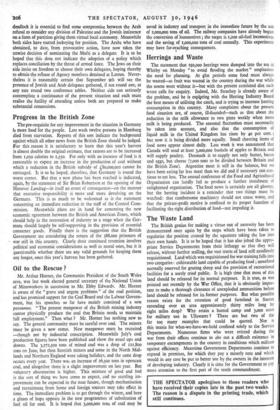Herrings and Waste
The statement that 192,000 herrings were dumped into the sea at Whitby on Monday "to avoid flooding the market" emphasises the need few planning. At glut periods some food must always be wasted—as fruit was wasted in the country during the war while the towns went without it—but with the present restricted diet such waste calls for enquiry. Indeed, Mr. Strachey is already aware of the problem, and he is explpring with the Herring Industry Board the best means of utilising the catch, and is trying to increase herring consumption in this country. Many complaints about the present food situation are, of course, ill-founded—such as that about the reduction in the milk allowance to two pints weekly when more milk is being produced. The seasonal fluctuation must necessarily be taken into account, and also that the consumption of liquid milk in the United Kingdom has risen by 40 per cent. ; but now it is being divided more equally. Small cheering items of food news appear almost daily. Last week it was announced that Canada will send at least 3,000,000 bushels of apples to Britain and will supply poultry. Denmark is to supply not only butter, bacon and eggs, but cheese (7,000 tons to be divided between Britain and the British Zone). Argentine meat is still in the balance, but we have been eating far less meat than we did and if necessary can con- tinue to eat less. The annual conference of the Food and Agricultutal Organisation can hardly fail to produce a further instalment of enlightened organisation. The food news is certainly not all gloomy, but the herring incident is a reminder that two things must be watched: that cumbersome machinery should not cause waste, and that the private-profit motive is confined to its proper function of facilitating the right distribution of food—not impeding it.


























 Previous page
Previous page